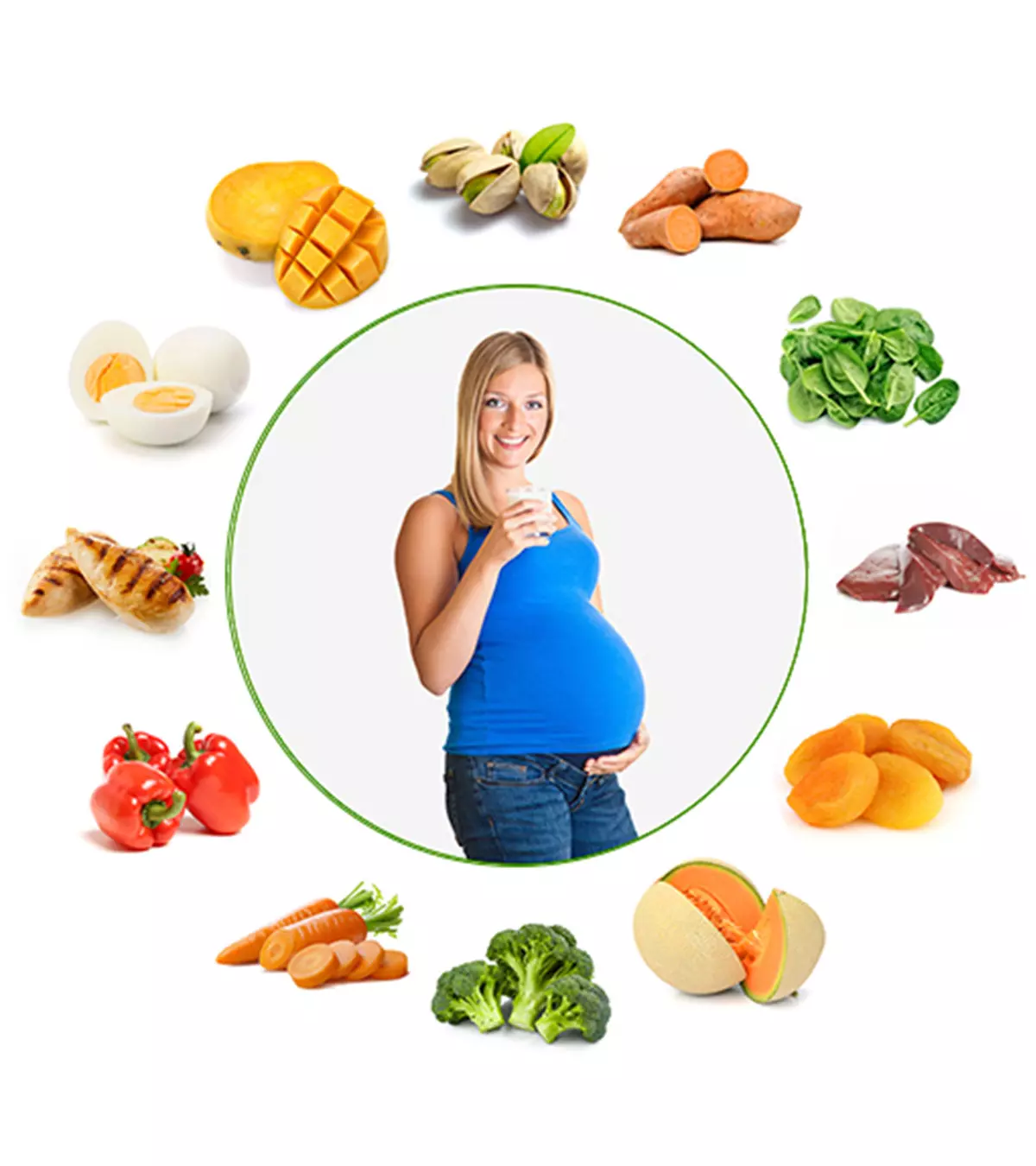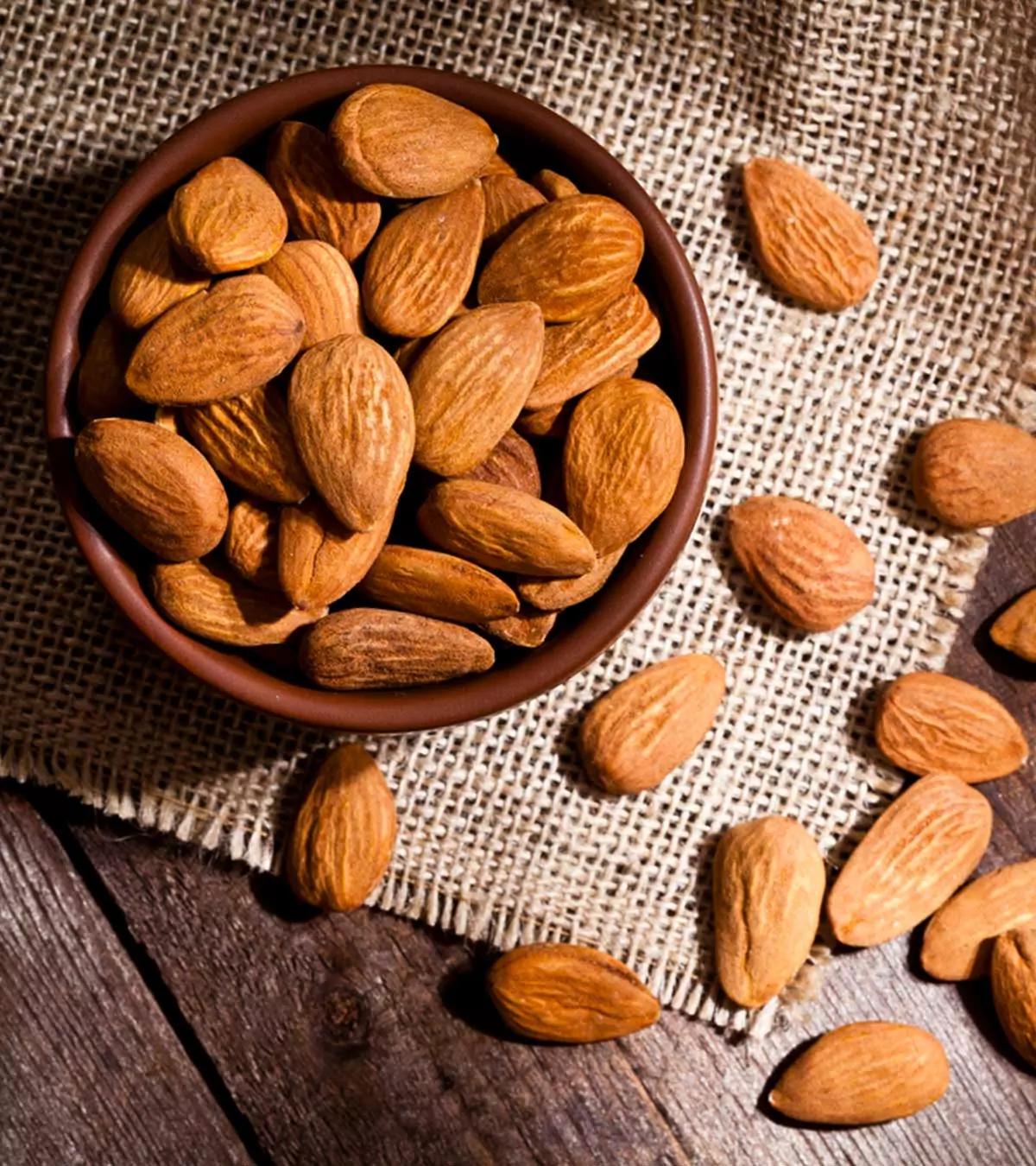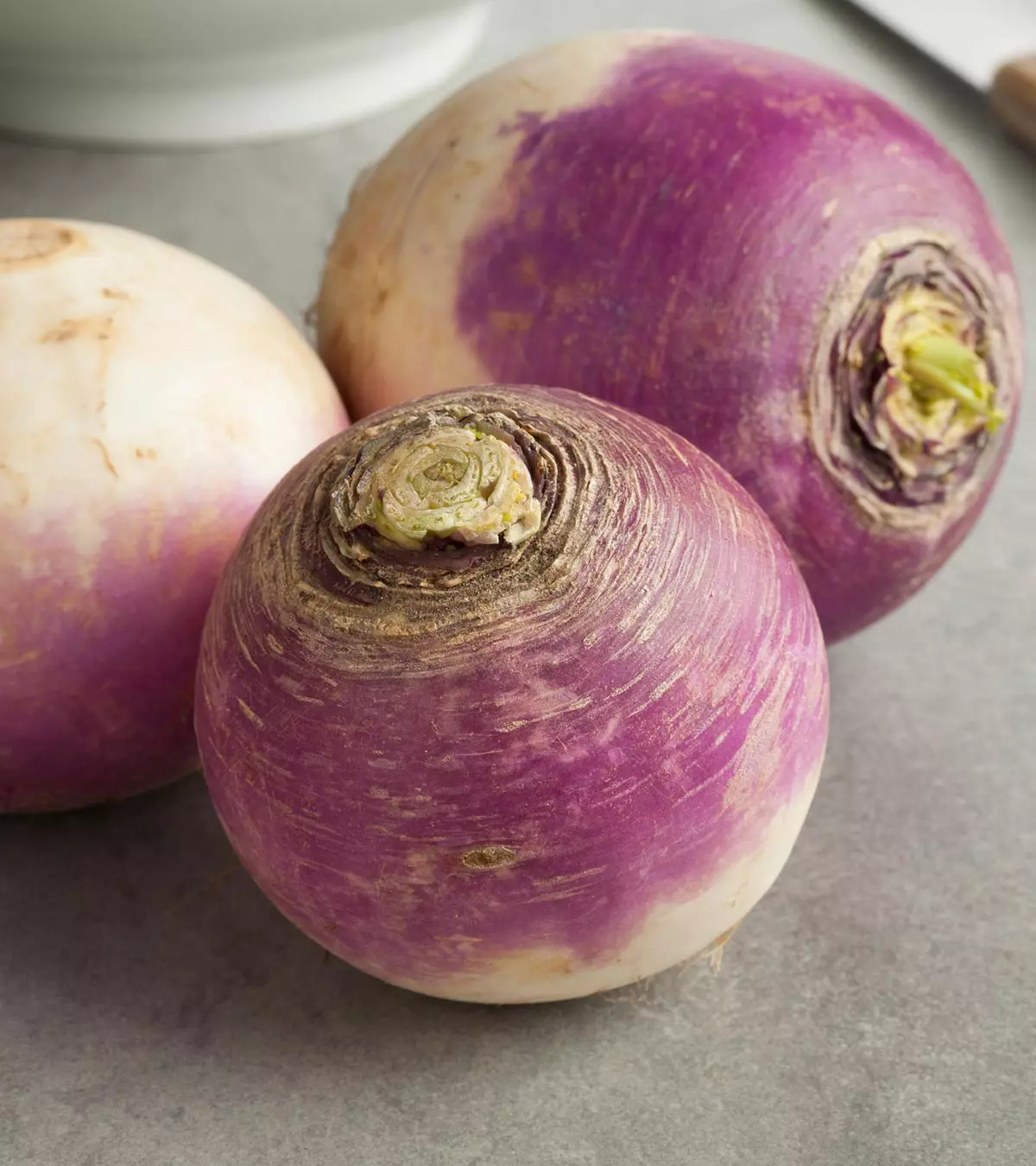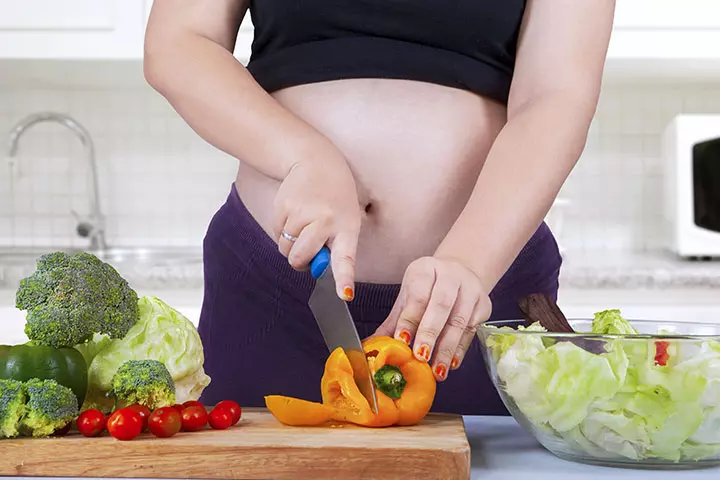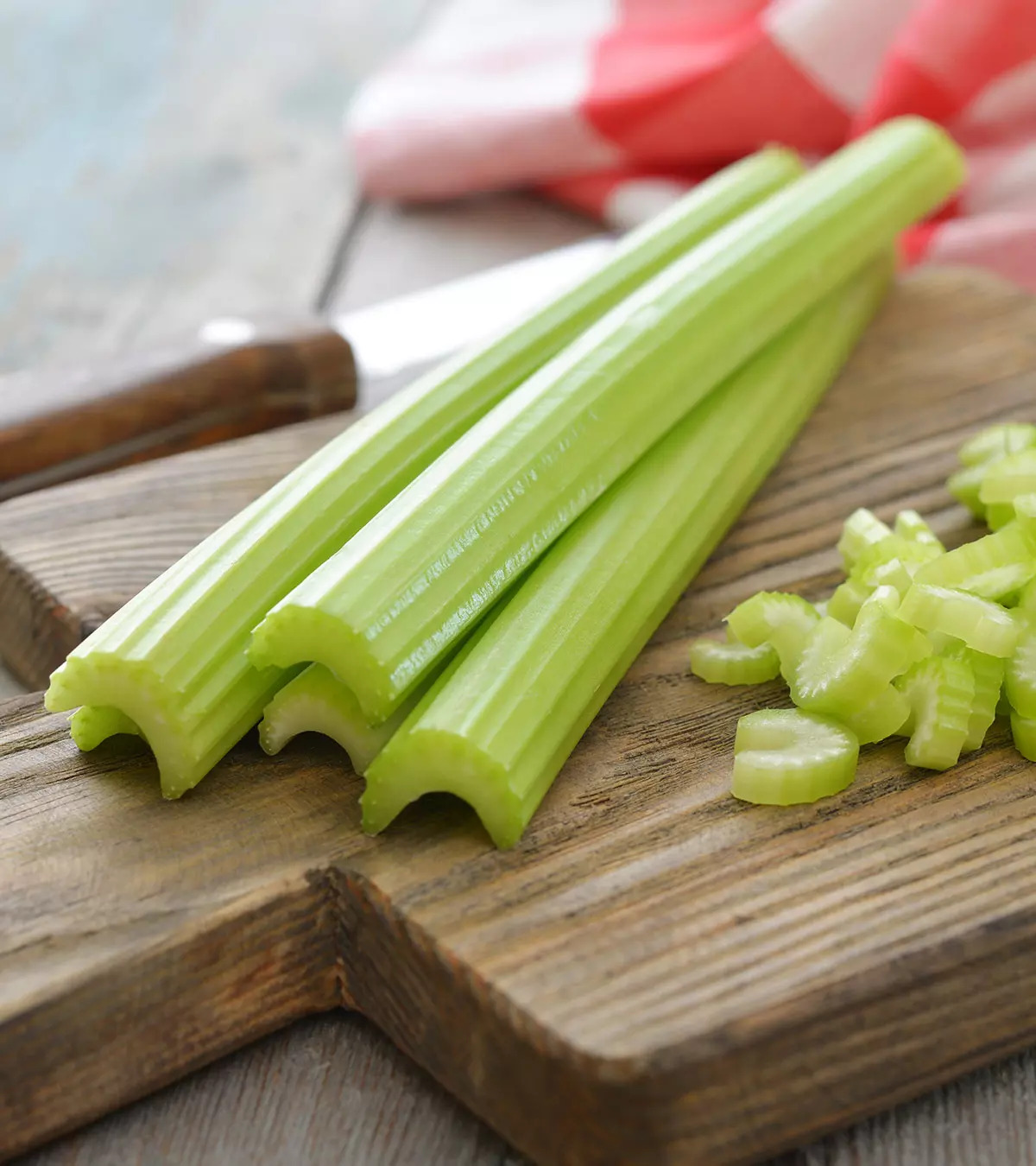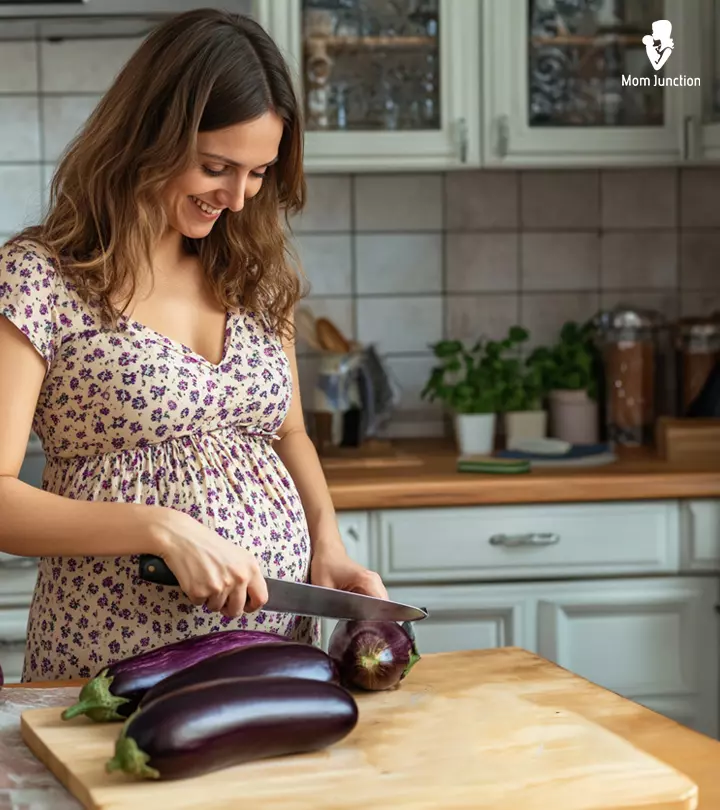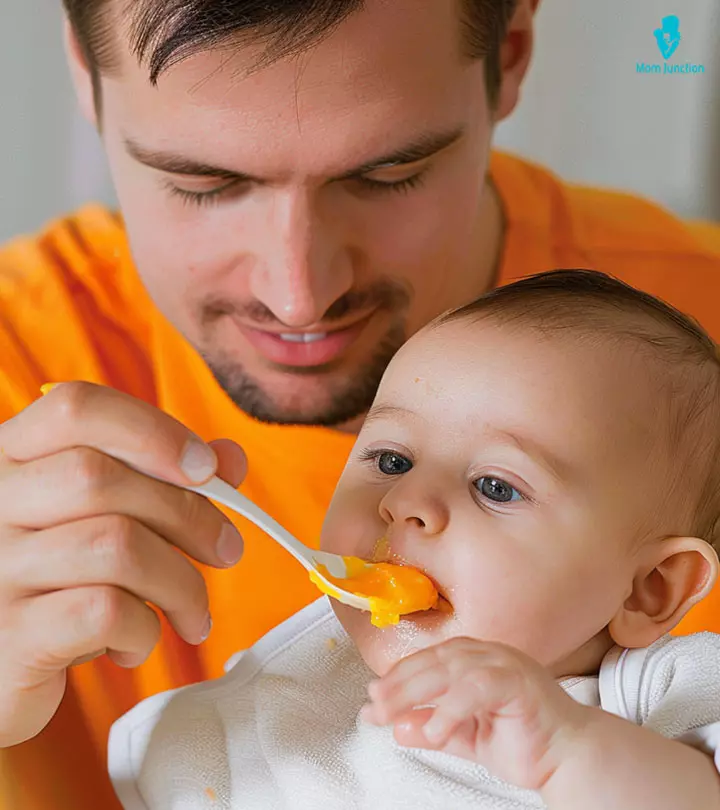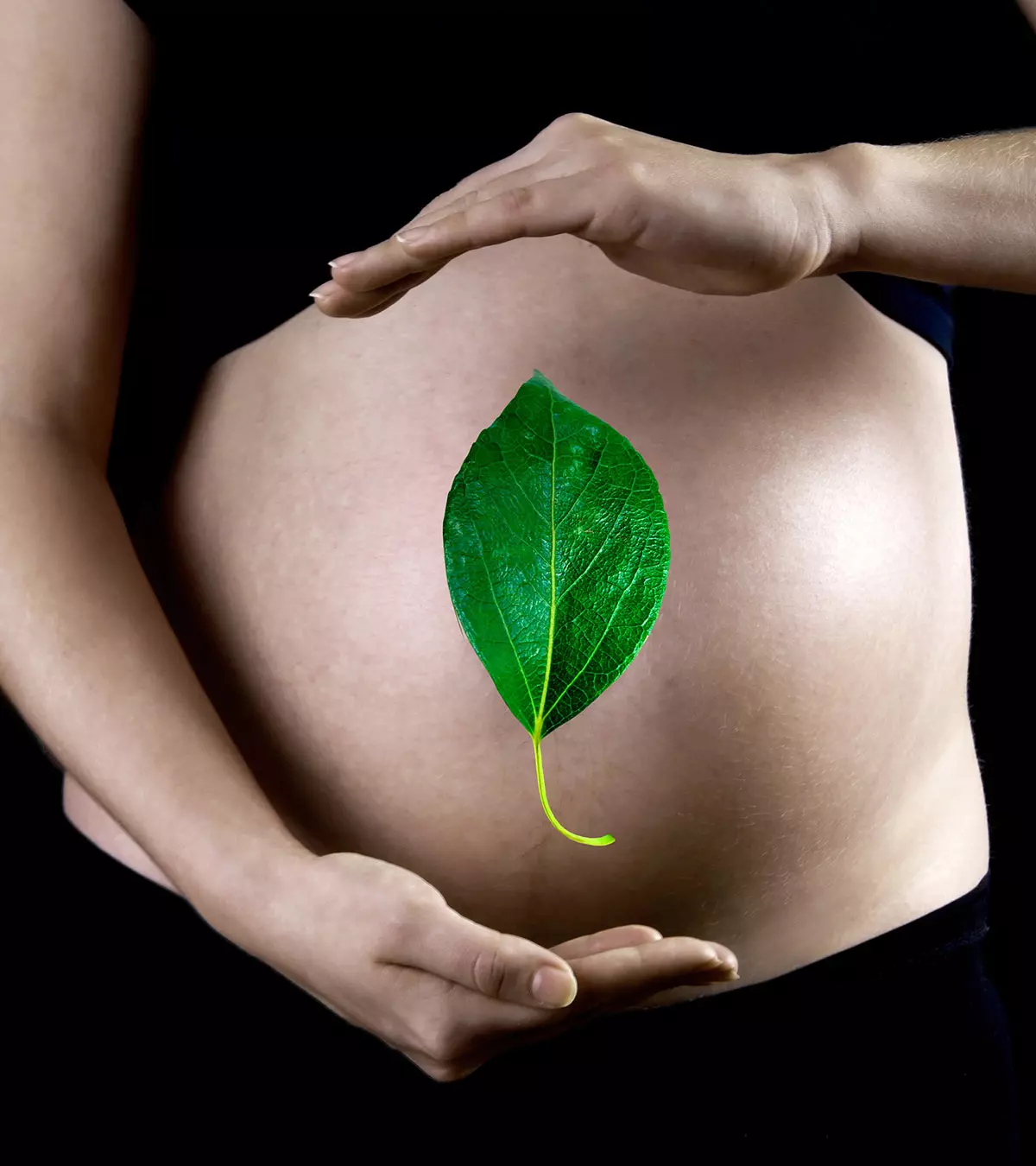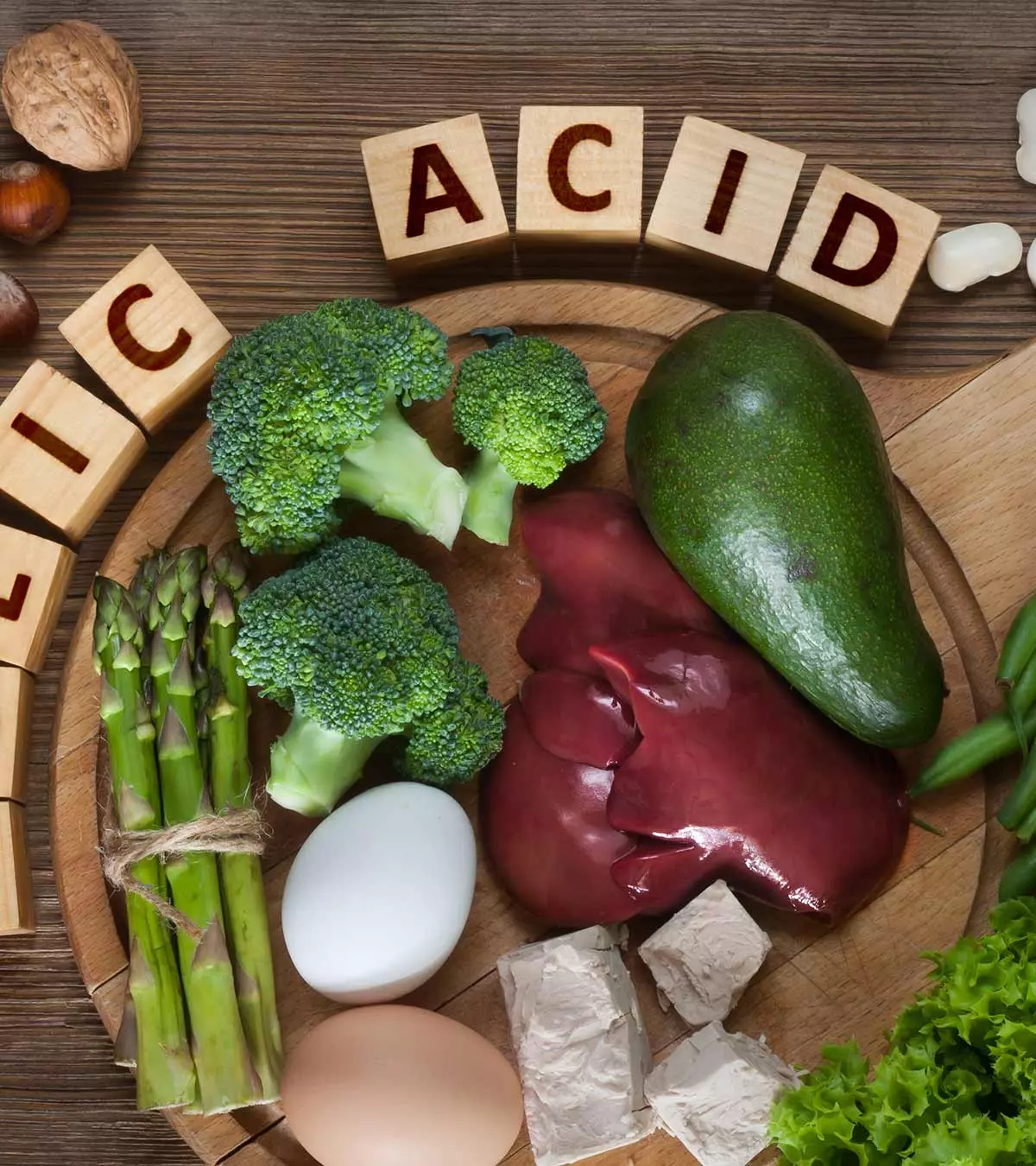
Image: Shutterstock
Edamame is a healthy, proteinaceous food, referring to soybeans that are not fully ripe and are known for their amazing health benefits. It is widely eaten in Japan but has recently become a popular snack food across many other parts of the world. Since edamame is less mature than soybeans, there are differences in the nutritional content of both foods. However, you can eat both edamame and soybeans during pregnancy as both are nutrient-rich and healthy sources of protein. However, you may have certain concerns about its safety for you and your baby. Understanding the nutritional value and safety of edamame is important before adding it to your pregnancy diet. Read on as we tell you whether it is safe to consume edamame during pregnancy, its nutritional value, potential health benefits, possible side effects, and how to consume it.

Key Pointers
- Edamame is a rich source of carbohydrates, protein, and fats.
- One serving of edamame a day is safe to consume during pregnancy.
- Edamame provides health benefits to pregnant women, including being a rich source of plant-based protein, low in calories, a rich source of folate, and high in fiber.
- Excess consumption of edamame may cause allergies, increase the risk of bleeding, and have negative effects on reproductive and fertility health.
- Pregnant women can eat edamame in different ways, such as boiling or steaming, adding to salads, soups, pasta, or dips, and mixing with eggs or roasted legumes.
Safety Of Eating Edamame During Pregnancy
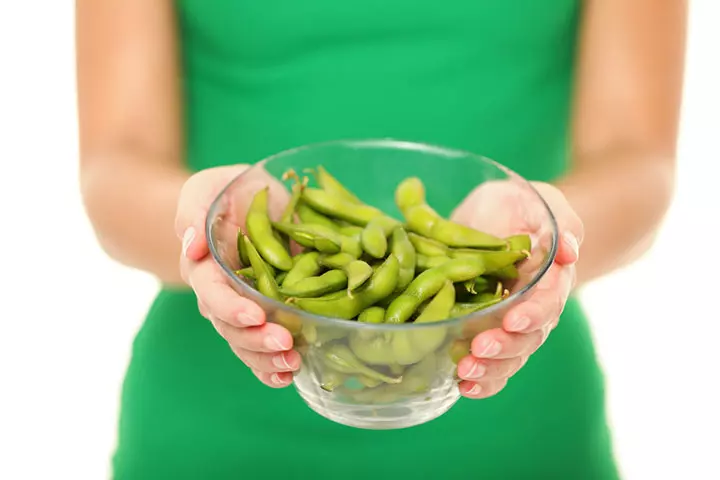
Pregnant women can safely eat one serving of edamame a day (13). However, there are some concerns regarding soy consumption during pregnancy. Therefore, if you are pregnant, include soy products in your prenatal diet only after getting your doctor’s approval. Also, it is best to consume organic soy products during pregnancy.
Nutritional Value Of Edamame
Edamame is a healthy legume that can help satisfy your daily requirement for many nutrients. According to the USDA (US Department of Agriculture), 100g of frozen and prepared edamame can provide the following nutrients (1):
| Nutrient | Amount |
|---|---|
| Energy | 121kcal |
| Protein | 11.9g |
| Carbohydrate, by difference | 8.91g |
| Fiber, total dietary | 5.2g |
| Calcium | 63mg |
| Potassium | 436mg |
| Iron | 2.27mg |
| Magnesium | 64mg |
| Phosphorus | 169mg |
| Vitamin C | 6.1mg |
| Folate | 311µg |
| Choline | 56.3mg |
| Vitamin A | 15µg |
 Nutrition fact
Nutrition factHealth Benefits Of Edamame During Pregnancy

The research on the health benefits of edamame or soybeans is ongoing. However, it is said to be good for cardiac health, bone health, cognitive function, and visual memory. It also provides relief from menopause symptoms such as hot flashes and protection against some cancers due to its high antioxidant content (2).
Further, eating soy products during pregnancy is generally quite safe (3). Here are some health benefits of eating edamame during pregnancy:
1. Rich source of plant-based protein
Edamame is a good vegetarian protein source that also provides several vitamins and minerals (1). Plant-based protein sources are healthier meat alternatives since they don’t contain saturated fats that increase the risk of heart disease (14). Pregnant women who follow a vegetarian or vegan diet can regularly eat edamame to meet their daily protein intake requirements. It is also a good source of calcium for women with lactose intolerance (1). Additionally, this high-protein food can also help manage morning sickness during pregnancy (15).
2. Low in calories
All legumes are rich in nutrients but low in calories. The body processes the carbohydrates in legumes at a steady pace; therefore, the consumption of legumes helps keep hunger pangs at bay and also helps in weight management. A small serving of legumes, such as edamame, can offer a generous mix of carbohydrates and numerous antioxidants (4).
3. Rich folate source

Edamame is a good source of folate (a type of B vitamin). Though folate is naturally found in foods, it is also added to the diet as folic acid. Folate minimizes the risk of birth defects in fetuses and reduces the risk of premature labor. All forms of soybeans are good sources of this essential vitamin for pregnant women and women planning for pregnancy (4) (5).
4. Rich fiber source
Edamame is also a rich source of fiber, which can help maintain good digestive health and prevent constipation, which is common among pregnant women (16).
In addition, the fiber content of this legume could help in blood sugar control when consumed as a part of a well-balanced diet. This property of edamame could be particularly helpful for women with gestational diabetes (16).
According to the US Centers for Disease Control and Prevention (US CDC), gestational diabetes affects 5 to 9% of pregnant women in the US annually (17). Managing sugar levels through effective lifestyle changes and eating a well-balanced diet containing high-fiber foods like edamame may help prevent sugar spikes.
5. Rich in Omega-3 fatty acids
Edamame is a plant-based source of omega-3 fatty acids, an essential nutrient that ensures a fetus’s proper brain and eye development. Additionally, it can help prevent depression in pregnant women. Therefore, adding edamame to your pregnancy diet can be beneficial, especially if you’re a vegetarian or vegan or cannot eat seafood (18).
 Nutrition fact
Nutrition factPotential Side Effects Of Eating Edamame While Pregnant
Eating edamame is good for your health and your fetal development but may have some side effects, including:
1. Allergies
Pregnant women with soy allergies should not consume edamame or soy in any form. However, pregnant women who are not allergic to soy must also not take soy supplements without their doctor’s approval. Some signs of soy allergy are nausea, hives, itching, diarrhea, and flushed skin (2).
2. Risk of bleeding
Pregnant women who are on blood-thinning drugs must monitor their consumption of soy products. Soy is rich in vitamin K, which enables blood clotting and may work against blood-thinning medicines (6).
3. Reproductive problems
All soy products, including edamame, contain large quantities of plant estrogen such as isoflavones. Though the research is inconclusive and insufficient, some studies suggest that neonatal exposure to isoflavones can have negative effects on reproductive development later in life (7).
4. Fertility problems

Pregnant women are at risk of consuming genetically-modified soy instead of organic soy. Crops that are genetically-engineered may have food safety issues and may increase the risk of fertility problems and affect reproductive health. Genetically modified and conventional soy receive herbicide treatment containing a substance called glyphosate, which may increase the risk of miscarriages (8) (9).
 Caution
CautionWays To Eat Edamame During Pregnancy
Edamame is available in frozen form in most grocery and health food stores. You can buy shelled edamame or ones still in their pods. Here are some ways you can incorporate edamame in your meals during pregnancy.
- Steam or boil edamame for 10 minutes in salted water. You can cook edamame in their pods or shell the beans. Remove from heat and once cool, you can enjoy a healthy snack that can help meet your fiber intake requirements.
Alyssa, a blogger, baker, and mother, relished boiled edamame during pregnancy. She says, “I love buying these bags of frozen edamame, defrosting them (usually by boiling them), and then sprinkling the bowl with a touch of salt or sometimes a little chili powder. It’s such a yummy snack (i).” - Add cooked or raw edamame to your fresh salads, soups, pasta, and rice dishes.
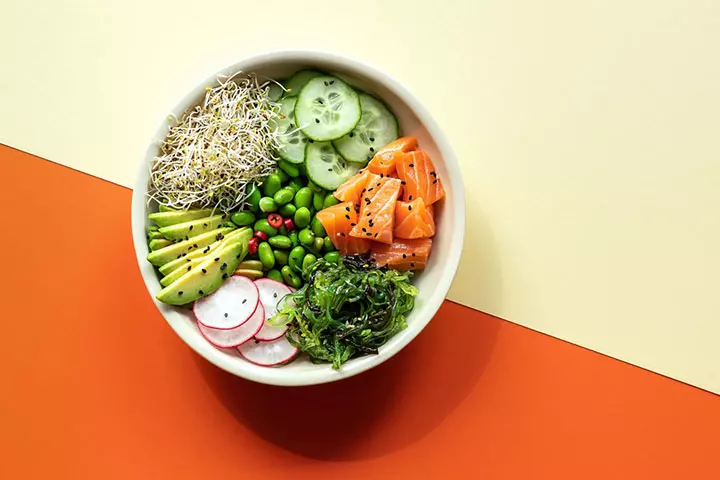
- Make a thick paste of raw edamame and mix it with avocado, artichoke, tomato, or herbs such as mint to make healthy dips.
- Add edamame to scrambled eggs and further fortify your dish with vegetables such as spinach, peppers, onion, broccoli and some cheese.
- Mix edamame with roasted peanuts or other roasted legumes for a healthy protein-rich snack.
- Stir-fry shelled edamame with broccoli, carrots, and spinach in one to two tablespoons of olive oil. Sprinkle lemon juice and herbs for flavor.
Frequently Asked Questions
1. Can edamame be eaten by pregnant women with high blood pressure?
Consuming edamame, which contains good cholesterol, may help manage hypertension and fluctuating blood pressure. Thus, you may consume edamame if you have high blood pressure (2). However, it is not uncommon for soy to interfere with the action of certain medications. Thus, consult your doctor first if you are on hypertension medications.
2. Can edamame be eaten by pregnant women with kidney problems?
Pregnant women with kidney problems should consult with their healthcare professional before consuming edamame or any other food, as their dietary needs and restrictions may vary depending on the severity and type of kidney problem.
3. Can edamame be eaten by pregnant women with thyroid problems?
Moderate consumption of edamame by pregnant women with thyroid problems may be safe. Soy may affect thyroid function in women with existing thyroid problems (11). Therefore, consult your doctor before having edamame if you have thyroid problems.
4. Can edamame be eaten by pregnant women with celiac disease?
Edamame is gluten-free and can be safely consumed by pregnant women with celiac disease (12). Do check before purchase if edamame is not stored with other foods containing gluten.
Edamame is loaded with proteins, carbohydrates, fiber, and several other vitamins and minerals. Eating a serving of edamame during pregnancy every day may provide you with adequate protein and folate. However, since edamame is a less mature soybean, its consumption may cause soy allergies or reproductive problems. If you are allergic to soybeans or soy products, talk to your doctor before consuming edamame. If your doctor asks you to avoid eating edamame, consume other sources of proteins such as kidney beans, lentils, or chickpeas during pregnancy.
Infographic: Ways To Include Edamame In Your Pregnancy Diet
Edamame is another name for green soybeans that are picked while young. These are recommended in pregnancy diets due to their high protein and nutritional qualities. The following infographic provides a few ways edamame can be included in your daily meals.
Some thing wrong with infographic shortcode. please verify shortcode syntax
Illustration: Is It Safe To Eat Edamame During Pregnancy?

Image: Dall·E/MomJunction Design Team
Discover the truth about soy as a healthy food. Learn the myths and facts about this popular food and how it affects your health with this video.
Personal Experience: Sources
MomJunction articles include first-hand experiences to provide you with better insights through real-life narratives. Here are the sources of personal accounts referenced in this article.
i. The Baking Yogi; Pregnancy Super Foods;https://bakingyogi.blogspot.com/2014/06/pregnancy-super-foods.html
References
- Edamame frozen prepared.
https://fdc.nal.usda.gov/fdc-app.html#/food-details/168411/nutrients - Soybeans and soy foods.
https://www.betterhealth.vic.gov.au/health/healthyliving/soybeans#health-benefits-of-soy-foods - Nutrition During Pregnancy.
https://www.acog.org/womens-health/faqs/nutrition-during-pregnancy - Healthy food trends – beans and legumes.
https://medlineplus.gov/ency/patientinstructions/000726.htm - Folic Acid: the Vitamin That Helps Prevent Birth Defects.
https://www.health.ny.gov/publications/1335/ - Blood Thinning Medications (Anticoagulants) and Cancer.
https://pearlpoint.org/blood-thinning-medications-anticoagulants-and-cancer/ - Elsa C. Dinsdale and Wendy E. Ward; (2010); Early Exposure to Soy Isoflavones and Effects on Reproductive Health: A Review of Human and Animal Studies.
https://www.ncbi.nlm.nih.gov/pmc/articles/PMC3257624/ - New Study Finds GM Grains Harm Reproductive and Digestive Health.
https://farmandranchfreedom.org/gmo-harms-reproductive-and-digestive-health/ - Medardo Avila-Vazquez et al.; (2018); Environmental exposure to glyphosate and reproductive health impacts in agricultural population of Argentina.
https://www.gmwatch.org/en/106-news/latest-news/18245-argentine-study-links-glyphosate-herbicide-to-miscarriage-birth-defects - Straight Talk About Soy.
https://hsph.harvard.edu/department/nutrition/ - Jemiliat Otun et al.; (2019); Systematic Review and Meta-analysis on the Effect of Soy on Thyroid Function.
https://www.nature.com/articles/s41598-019-40647-x - Is Soy Gluten-Free?
https://www.beyondceliac.org/gluten-free-diet/is-it-gluten-free/soy/ - Nutrition during pregnancy and early years.
https://whathealth.akfportugal.org/brochures/Brochure_2_EN.pdf - High-protein foods: The best protein sources to include in a healthy diet.
https://www.health.harvard.edu/nutrition/high-protein-foods-the-best-protein-sources-to-include-in-a-healthy-diet - Morning sickness: 10 foods that fight nausea during pregnancy.
https://www.themotherbabycenter.org/blog/2025/08/foods-that-fight-nausea-during-pregnancy/ - Foods high in fiber: Boost your health with fiber-rich foods.
https://www.health.harvard.edu/nutrition/foods-high-in-fiber-boost-your-health-with-fiber-rich-foods - Gestational Diabetes.
https://www.cdc.gov/diabetes/about/gestational-diabetes.html - Power Your Body with Foods Rich in Omega-3 Fatty Acids.
https://healthcare.utah.edu/healthfeed/2025/03/power-your-body-foods-rich-omega-3-fatty-acids
Community Experiences
Join the conversation and become a part of our nurturing community! Share your stories, experiences, and insights to connect with fellow parents.
Read full bio of Moloko Mehlape
Read full bio of Ria Saha
Read full bio of Swati Patwal
Read full bio of Lorraine Teron








